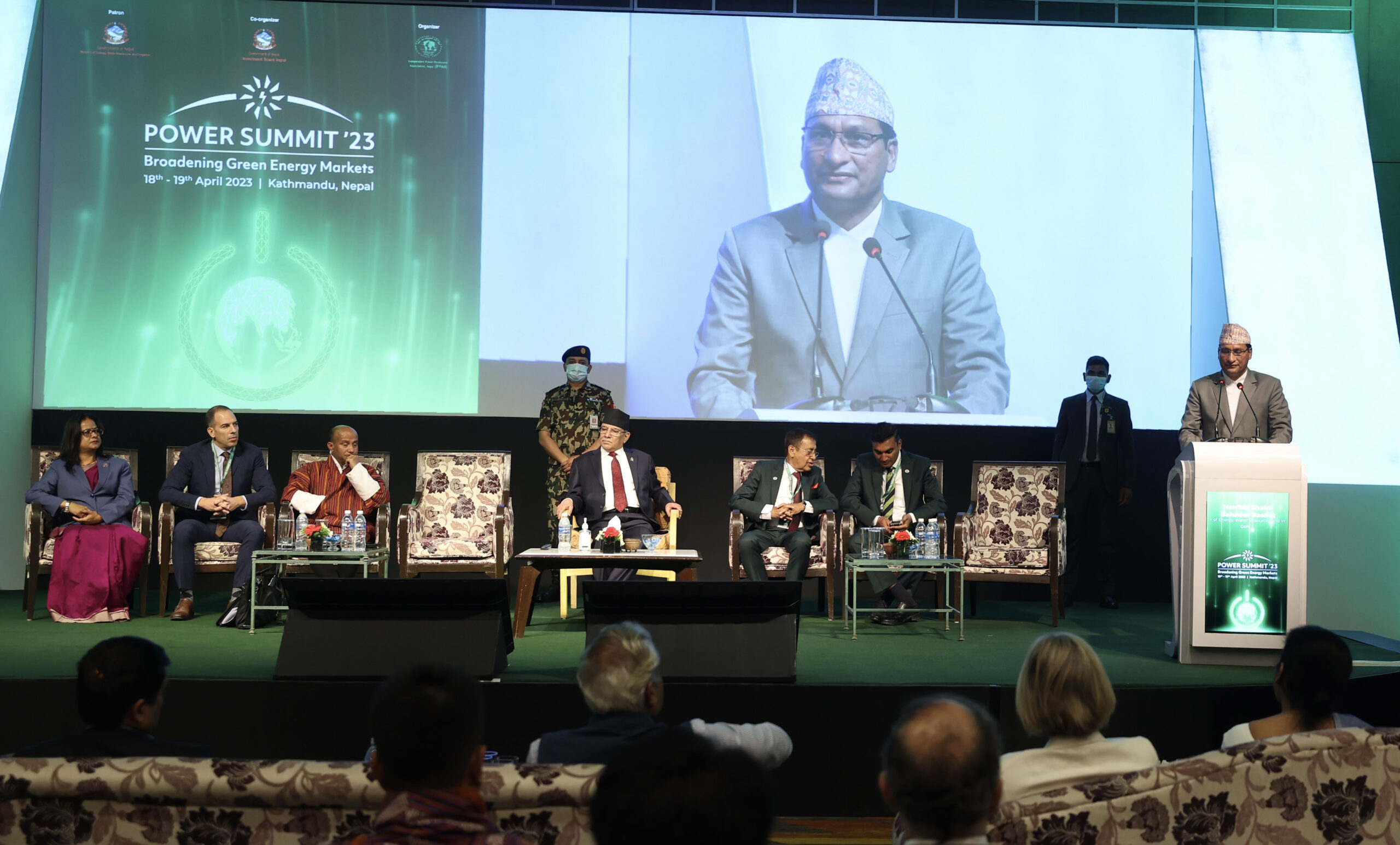Climate change is a global problem that is of concern to everyone and requires a global solution.
The whole world has talked a lot about climate change. It is not a problem of the future but is already affecting Nepal and many parts of the world.
The poor, who did little to create the problem, are going to pay a heavier price. Therefore, I believe that the topic for Summit is very relevant.
At present, our total installed capacity is 2650 MW, out of which, 1136 MW is from NEA and its subsidiaries and 1514 MW is from IPPs.
The peak demand in first quarter of year 2023 is 1840 MW. We have more than 96% of population access to electricity and we are planning to make 100 % in the coming two years both by extending grids and building off grid generations.
NEA has started to export its surplus energy of the wet season in the Day Ahead Market of India.
The Government of Nepal and the Ministry for Energy, Water Resources and Irrigation is committed to work with the private sector to develop the needed policies, rules and regulations, provide the needed incentives and enable the expansion of the markets for green energy.
The total export to India soared to 493 GWh in FY 2021/22 through the Dhalkebar-Mujhaphapur 400 KV transmission line.
To take care of the more generation incoming to Nepal’s grid in an accelerated pace, Nepal and India have already started construction of New Butwal-Gorakhpur second 400 kV cross border transmission line.
On top of that, Nepal and India in their power secretaries level meeting recently held in mount Abu of India decided to implement the two additional 400 kV interconnection links between the two countries.
Similarly, the initiatives taken by Nepal and Bangladesh after the signing of the MoU in 2018 indicate that there is a strong possibility for multiple trans-border energy flows and exchanges among Nepal, India and Bangladesh.
This way, Nepal is ready to work with our neighbours to extend the market for our surplus green energy so that all can benefit from this resource.
This Power Summit will create the needed space to build on past efforts and produce concrete next steps on how we should move ahead.
The benefits of developing the market for Nepal’s green energy must reach the people of Nepal.
Only when the last Nepali has enjoyed the fruits of this immense power, we can declare that Nepal is a truly a “green energy powered country”.
Out of the generation data I just presented, 96% comes from hydropower which is clean and green.
As the green generations are being added to the system in an accelerated way, we are gradually increasing the stake of electrical energy in the overall energy pie of the country.
Nepal’s power generation momentum indicate that it can even help its neighbouring countries to achieve their nationally determined contributions (NDC) targets after meeting our own goals of emission reduction.
It is high time for Nepal chalked out the pathways for clean energy transition for which both IPPs and the government can join hands work together.
We realize that there are challenges ahead and let me take this opportunity to assure you that we are fully committed to learn for the power summit and convert this learning with actions for Nepal’s development.
Nepal will continue to innovate and develop and also promote technologies that help generate and make efficient use of our green energy.
As Nepal has tremendous potential for investment in the power sector, let me invite the prospective developers from the world community to come and invest in Nepal in any modality mutually agreed based on our investment friendly FDI laws.
We shall all listen to the discussions about innovation, climate change, mobilizing financial resource for broadening the markets for green energy, as well as the best ways to build the needed infrastructure for this purpose.
The necessary legal arrangements for the production and effective use of green energy will also be further strengthened by the Government of Nepal.
The Government of Nepal and the Ministry for Energy, Water Resources and Irrigation is committed to work with the private sector to develop the needed policies, rules and regulations, provide the needed incentives and enable the expansion of the markets for green energy.
In this regard, a New Electricity Bill will be presented to the Parliament very soon. Under this legal arrangement, the private sector will be involved in the Power Trading business as well.
In addition to this, the government of Nepal has a policy of encouraging bilateral and multilateral partnerships including private sector and public private partnerships for the production of green hydrogen and its co-products by creating a green hydrogen policy.
As has been brought to my notice, the papers to be presented in the Summit will give additional direction to the “Broadening Green Energy Markets” in Nepal.
I am confident that the conclusion drawn from the vigorous brain storming, dialogues, and discussions among the experts having long time experience in this sector, National and International Investors, Project Developers, Energy Traders, Representatives from Bank and the Financial Institution will certainly deliver direction and guidance for our forthcoming footsteps.
As Nepal has tremendous potential for investment in the power sector, let me invite the prospective developers from the world community to come and invest in Nepal in any modality mutually agreed based on our investment friendly FDI laws.
(Edited version of the speech given by Minister of Energy Shakti Basnet in the two-day Power Summit 2023 in Kathmandu)









Comment